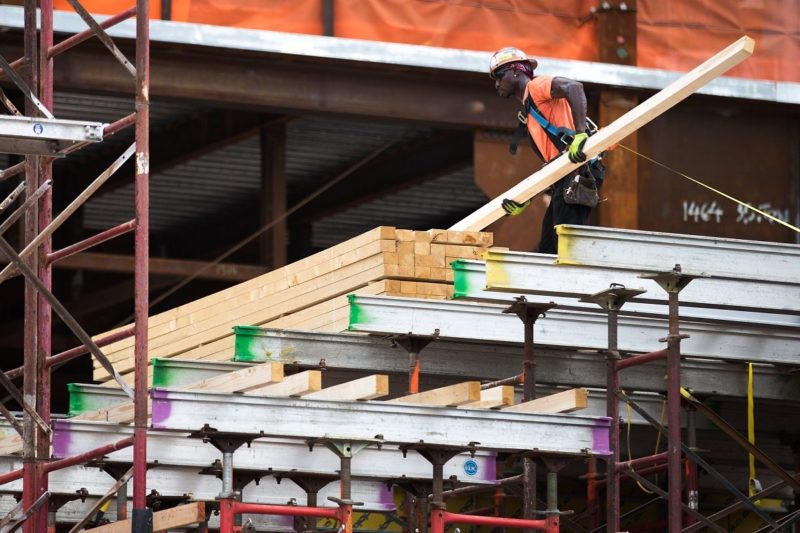Efforts to Protect Workers of Color ‘Deeply Complicated’ by Trump’s Election
“We’ve argued that they are not doing enough to proactively monitor employment practices and mandates, which have an impact on outcome, and now we fear they may do even less,” Rinku Sen, executive director of Race Forward, said of the federal government.

Racial justice advocates are concerned that the systemic barriers affecting workers of color are poised to intensify under a Donald Trump presidency.
A new report from Race Forward argues that Title VII of the 1964 Civil Rights Act, which protects people who work from intentional discrimination, is falling short of achieving racial equity for workers of color.
“More than 50 years after Title VII’s inception, [the report] serves as a wake-up call that workers of color still face far too many barriers when seeking justice within the anti-discrimination system created by the law,” Dominique Apollon, research director at Race Forward, said in a statement.
“Our mission is deeply complicated by the recent election and further complicated by a Trump presidency in which we are already seeing increased incidents of explicit racism,” Rinku Sen, executive director of Race Forward, said during a press conference Thursday.
More than 400 incidents of hateful intimidation and harassment have been recorded by the Southern Poverty Law Center since Donald Trump won the presidential election, including many incidents that directly reference Trump’s campaign and its slogan.
Title VII prohibits employers from discriminating against workers on the basis of race, color, religion, sex, or national origin. Worker advocates across multiple industries reported to Race Forward that intentional and unintentional racism, as well as gender discrimination, occur “frequently” or are a “daily reality.”
Sen said she expects the new administration will chip away at the safeguards in place for vulnerable workers, using legislation, budget appropriations, and appointments to the courts and the Department of Labor.
“We’ve argued that they are not doing enough to proactively monitor employment practices and mandates, which have an impact on outcome, and now we fear they may do even less,” she said.
Comments from President-elect Donald Trump and House Speaker Paul Ryan (R-WI) about business industries being over-regulated, especially in the environmental realm, indicate how they might respond to employment discrimination, she added.
During his campaign, Trump talked about his intention to undercut Obama’s effort to limit carbon emissions at coal-fired plants and to undo domestic and international climate-change policies. The New York Times anticipates Trump will roll back Dodd-Frank and place limits on the new rule increasing overtime pay for low-wage workers.
Released last week at Facing Race, Race Forward’s national conference in Atlanta, the report reviews the systemic barriers affecting workers of color, drawing on academic research, interviews with discrimination lawyers and officials of the U.S. Equal Employment Opportunity Commission (EEOC), and surveys of worker advocates.
Race Forward’s report examines the challenges with the system Title VII set up to deal with workers’ racial discrimination claims, arguing that it is largely reactive and too focused on employer intentions rather than equitable outcomes. In addition to reinforcing the existing anti-discrimination legal structure, Race Forward recommends a proactive strategy, using pressure, incentives, and mandates to influence employers.
The report recommends increasing pressure on employers to voluntarily adopt racially equitable policies, for example with more news investigations on EEOC enforcement; creating government incentives, like tax breaks, for businesses to adopt best practices that combat the impact of hidden biases; and passing mandates, like state-level Workers Bills of Rights and “hiring goals” in industries with large racial gaps in employment.
“The system has been largely reactive and complaint-driven, depending on vulnerable employees,” Apollon said. “All kinds of systemic barriers prevent many workers from receiving justice in the system. We need to proactively promote racial equity.”
Lola Smallwood Cuevas, director of the Los Angeles Black Worker Center, spoke at the Facing Race conference last week about seeing first-hand how Black workers are stuck in low-wage, dead-end jobs, especially in construction.
“It is not enough to say we will rebuild infrastructure without ensuring that communities that are neglected are represented equally and fairly,” she said.
Black, Muslim, and immigrant workers are “in a lot of fear” because of how they have been treated at rallies this election cycle, and any erosion of Title VII will compound the exploitation and exclusion they face. “We need to ensure their protections are in place,” Smallwood Cuevas continued.
Some groups, however, have achieved success by working outside the slow legal and administrative systems established by Title VII.
The report points to the LA Black Workers Center, which waged a local campaign to secure labor agreements for underrepresented workers in the construction industry. The National Domestic Workers Alliance won passage in Massachusetts of a Domestic Workers Bill of Rights to improve working conditions in an industry where women of color are overrepresented. And the Laundry Workers Center in New York City helped retail and warehouse workers unionize and launch a consumer campaign to improve their working conditions.

